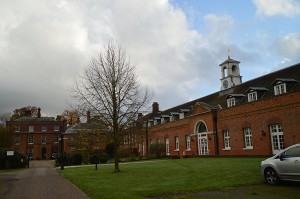
When it comes to Cumberland Lodge — a former royal residence, a picture just emerges where political elites were secretly whispering about how to formulate a grand strategy. This was what this year’s IR community were going to do at Cumberland Lodge. After fighting their way out of London’s Friday evening traffic, the attendees from the International Relations Department arrived at Cumberland Lodge, embarking for an exciting academic weekend on grand strategy.
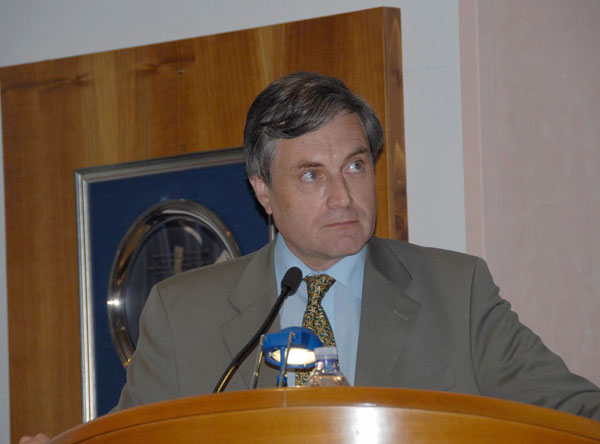
After dinner and a short welcome speech, the programme was kicked off by Professor Christopher Coker who presented a paper on “How ‘Grand’ is Grand Strategy?”. He gave a definition of grand strategy as the intellectual architecture that structures the foreign policy and helps nations to find their way in the word. Then, he argued that, basically what makes a strategy grand is a perfect combination of grasp of geopolitical realities, sweep of a historical narrative, coherence of design and nobility of vision. Small powers can hardly achieve the four, thus, it is only great powers which can have a grand strategy. So, grand strategy is also about the order of the international system set by dominant powers. According to him, however, now few powers really have a grand strategy. Democratic regimes, because of the short termism, suffer from an excessive focus on short-term results at the expense of long-term interests, thus making a grand strategy impossible. However, it remains a question whether the concentration on the short-term is an inevitable human condition, thus, any government could hardly achieve a grand strategy. Then, it is only in historians’ works a grand strategy could emerge. When historians look back at human history, they can come up with some patterns or systems which could be named as grand strategy.
Later, people gathered at the bar to enjoy some drinks. Heated academic debates did not stop. Among all the laughters and cheers, one’s ear could catch a word or two about grand strategy.
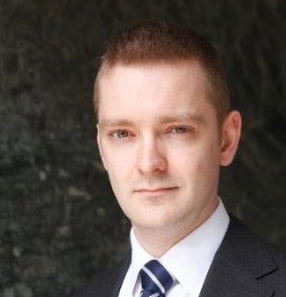
The second day in fog was started with the typical English breakfast. Then, Dr. James Strong gave an inspiring speech on the UK’s grand strategy. His main argument was that Britain does not have a grand strategy now, but it is punching above its own weight. To be more specific, there are three dilemmas the UK is faced with in making a grand strategy: how to come to term with the history of the British empire, how to mobilise rescuers in a austerity age, and how to translate grand strategy into implementation in an unruly democratic state. The British people are rather proud of their glorious past that they tend to still cling to that history. That can be a deep motive of the UK to act as a great power in world politics. However, Britain can afford some aspects of a great power: its unnegligible soft power, its special relationship with the only super power in the world — the US, the still formidable military strength and one of the most stable economies in Europe. However, the irony lies in that the UK attempts to maintain them, not because it is now a great power, but with them, it can become or return to the status as a great power. During the Q&A session, Dr. Strong implied that Britain has to face its limited capability and act more realistically.
Different from a fallen empire, as a sharply rising power, the grand strategy of China is attracting increasing attention. After a coffee break, Dr. Kirsten Ainley chaired a discussion of Chinese grand strategy and Professor Christopher Hughes gave a speech on “Sailing on the Silk Road: China’s Grand Strategy Submerges”.
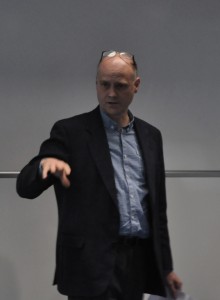
While the former speakers would argue that now few countries including the UK have a grand strategy, Professor Hughes believed China to have a clear grand strategy. The China Dream as well as Asia Pacific Dream perfectly illustrates China’s grand strategy. He used President Xi Jinping’s proposal of building the maritime Silk Road in the 21st century as a point of penetration for his analysis. This economic design has significant political and military implications since China has always dreamt of restoring its regional hegemony through a combination of economic, military and soft power. Professor Hughes was pretty critical about China’s official discourse of “harmonious world” and “harmonious ocean” which is a legacy of the idea of harmony in Confucianism. He argued that, according to history, when diplomacy failed, China would not hesitate to resort to violence against its neighbours. Nowadays, China is becoming increasingly aggressive regarding East China Sea and South China Sea as it is rising sharply in the international arena through a set of measures while it attempts to justify its acts as defensive. However, a defensive act of China can be viewed by its neighbours as offensive because of the security dilemma. Professor Hughes concluded that China does have a coordinated grand strategy and is approaching it step by step. However, the very grand strategy exacerbates the conflicts with its neighbours and the surrounding environment of China.
After a heated discussion of Chinese grand strategy and its influence on China and its neighbours as well as other great powers in the world, it was lunch time. Some of the attendees embarked on the journey to Windsor Castle after lunch when mists dispersed. The countryside view so gorgeous that they lingered on the way to enjoy it.
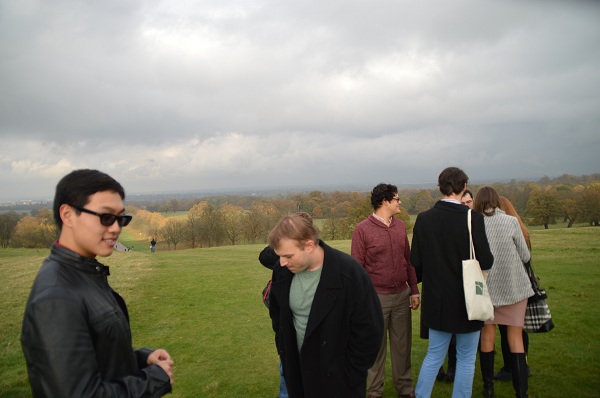

Professor Peter Trubowitz started the afternoon session with a discussion of “American Power and Strategy”. His emphasis was on the essential components of a grand strategy, that is power and, to be more specific, it is the resources leaders can mobilise to pursue national interests. Professor Trubowitz agreed that America is experiencing a relative decline of international influence. It now has to deal with mistrust and objection from both its foes and allies. In order to explain the declining international influence of America, Professor Trubowitz took an inside-out approach, looking at domestic politics instead of its behaviour abroad. Basically, the American government, because of its constitution, has a relatively high “discount rate” in mobilising resources to seek for national interests. When the international environment is not permissive and the outside threat is impending, the government tend to implement its foreign policy more efficiently. however, the fall of bipartisanship and the rise of polarisation of the two parties leave American domestic politics in a more divided situation, thus increasing the discount rate so that the efficiency and continuity of foreign policy would be influenced significantly. Thus, America is experiencing troubles now not because of relative power decline but the deterioration in its domestic political environment.
This new perspective to look at American grand strategy touched off a hot discussion. Then, after dinner, the drama reached its climax during the round table discussion on “Grand Strategy and its Alternatives”. Around the discourse of gender, the ethic of grand strategy and whether the existence of an enemy is necessary for grand strategy, intensive debates were opened up.
Saturday ended in a carnival of hot dance. Aware of endless reading and impending deadlines, many students just made merry while they could during the last night at Cumberland Lodge.
What would come finally came. Exhausted, people appeared at the dining room in the morning of the last day at Cumberland Lodge. After breakfast, some of them went to attend Matins at the Royal Chapel. It was said that they would possibly have a tiny chance to see the Queen, but no one took it seriously. Then, they met with Her Majesty the Queen! Everyone got so excited when they came back. “After five minutes of embarrassing silence, I realised it was Her Majesty”, said Josh.

Those who saw the Queen missed an insightful presentation on “Does an Emerging Power need a grand strategy” from Professor William Callahan. Both of the two eye-catching emerging powers — India and China have a dream which is grand strategy. Professor Callahan’s focus was on China’s dream. He then presented a interview about the different interpretations of China Dream of different groups of Chinese people. Afterwards, during the Q&A session, he further explained several issues concerning China Dream, for example, why it is not until recently that Chinese grand strategy becomes a hot topic and the incompatibility of dreams of different great powers. In the exciting discussion, the conference came to an end.
After lunch, people embarked on the journey back to the real world. Then, it was time to think about a grand strategy for reading and essays.
Report by Ruixuan Zhou
MSc International Relations Theory




